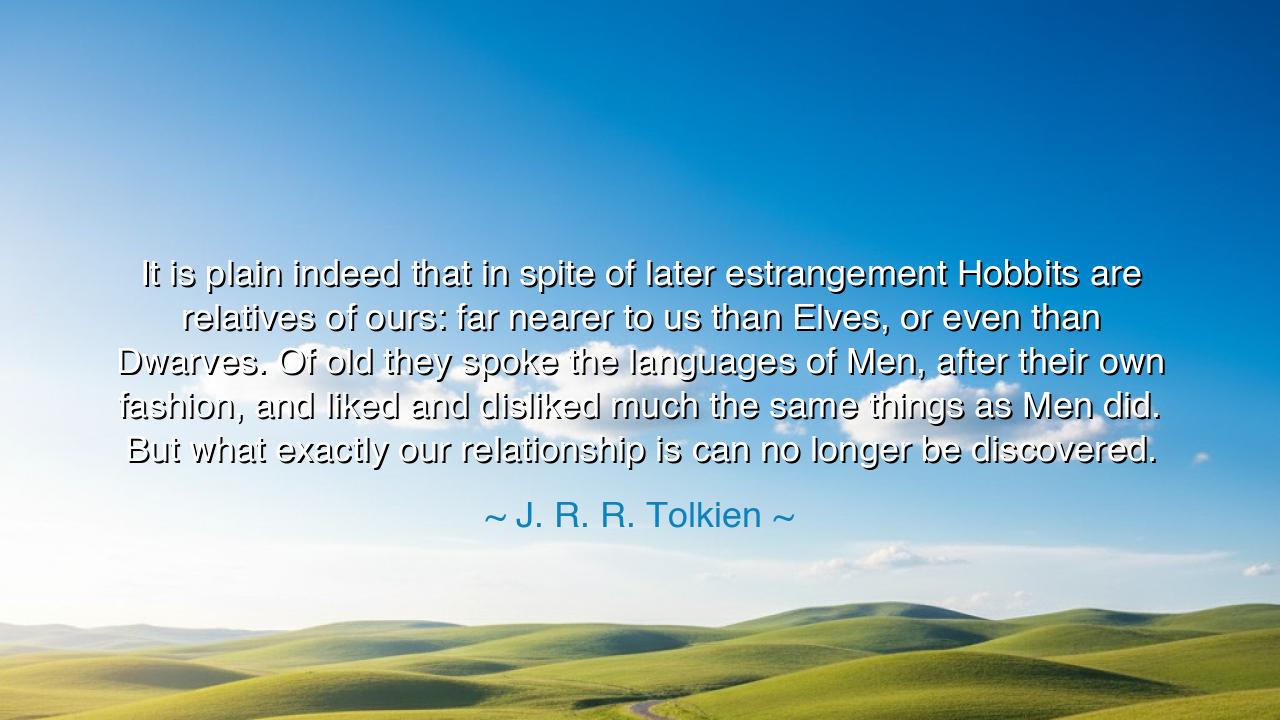
It is plain indeed that in spite of later estrangement Hobbits
It is plain indeed that in spite of later estrangement Hobbits are relatives of ours: far nearer to us than Elves, or even than Dwarves. Of old they spoke the languages of Men, after their own fashion, and liked and disliked much the same things as Men did. But what exactly our relationship is can no longer be discovered.






The words of J. R. R. Tolkien—“It is plain indeed that in spite of later estrangement Hobbits are relatives of ours: far nearer to us than Elves, or even than Dwarves. Of old they spoke the languages of Men, after their own fashion, and liked and disliked much the same things as Men did. But what exactly our relationship is can no longer be discovered”—carry with them the air of mythic remembrance. They speak to the yearning of mankind to understand its kin, its forgotten bonds, and the mysteries of its origins.
The ancients often spoke of lost relatives, races of men who had vanished into legend, or kinships broken by time and wandering. Tolkien, a master of such lore, echoes this tradition. The Hobbits, simple yet wise, reflect the very essence of humanity’s heart: its loves of home, of hearth, of humble joys. Though estrangement has clouded the memory, the blood of kinship lingers, like an echo from the deep past.
The mention of languages binds them further. For language is not merely a tool of speech, but the vessel of thought and soul. That Hobbits once shaped their words after the tongues of Men shows they shared not only the same earth but the same way of seeing the world. Their laughter, their songs, their quarrels and comforts—these mirror our own, making them nearer to us than the more noble Elves or the hardy Dwarves.
Yet the sorrow lies in the veil of mystery. The exact relationship between Men and Hobbits is now “no longer discovered,” lost to the ages. So it is with many truths of origin: we know we are bound, but the thread has frayed. The ancients would have called this the sadness of time, the fading of memory that turns living kinship into legend.
So let this teaching endure: though peoples may drift into estrangement, their shared loves and sorrows betray their kinship. We are never as far from one another as we believe, for in language, in joy, in simple human things, we discover echoes of ourselves. And though the precise line of relationship may be lost, the spirit of kinship remains, reminding us that no race, no people, stands wholly apart.






NBNgoc Nguyen Bich
Tolkien’s portrayal of Hobbits as being more like us than Elves or Dwarves really emphasizes the deep connection between different beings. Yet, the idea that we can no longer fully understand our relationship with them feels melancholic. Is this a commentary on how time and distance can cause us to forget or misinterpret our past connections? How does this apply to our real-world relationships—how often do we lose sight of what truly connects us?
ANAnh Nguyen
I find Tolkien's words about Hobbits striking. The fact that they were once so similar to Men yet have become so estranged makes me wonder about the nature of change. How often do we, as humans, lose touch with the aspects of ourselves or others that once felt familiar? Is this estrangement a natural part of growth or a result of neglecting the things that once connected us?
HKVo Huu Kien
The idea that Hobbits are 'far nearer to us than Elves' is intriguing. Tolkien seems to be suggesting that there’s a deep connection between humans and Hobbits, one that is lost over time. Why do you think Tolkien emphasizes this estrangement? Could it be a reflection on how societies grow apart or change so much that we lose the ability to truly understand those who were once like us?
VKNguyen Dai Vinh Khang
Tolkien's quote about Hobbits being 'nearer to us than Elves or Dwarves' makes me think about the idea of belonging and shared experience. Despite their estrangement, Hobbits still resemble us in many ways. Does this highlight how we often overlook the commonalities between us and others in the real world, focusing instead on our differences? Could the loss of understanding our relationship with Hobbits be a metaphor for the disconnect we feel from others today?
ADAbcdak Dhakgf
Tolkien’s reflection on Hobbits really resonates with me. The idea that Hobbits, despite being so different from us, share so many similarities with humans is fascinating. It’s as if he’s saying that even in fantasy, there’s a part of us that’s relatable to these characters. But what does it mean that we no longer fully understand our connection with them? Does this mirror how we sometimes lose touch with our own roots or heritage?